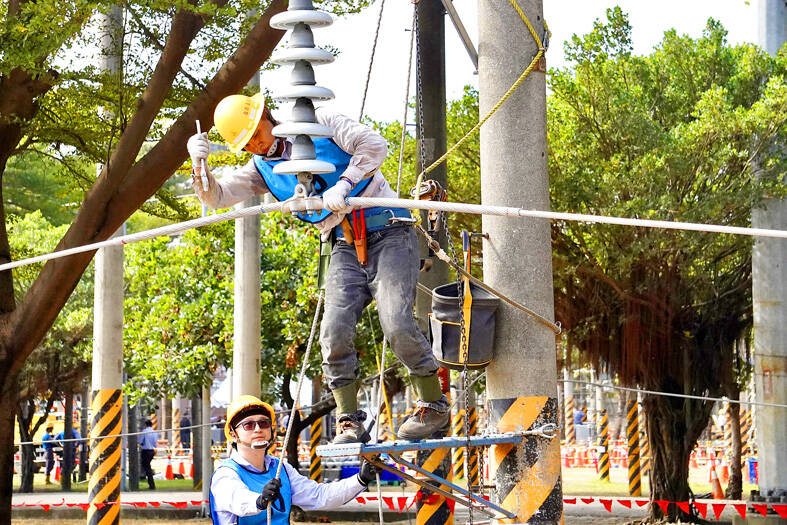Taiwan Power Co (Taipower, 台電) on Thursday signed a memorandum of understanding (MOU) with Japan’s IHI Corp and Sumitomo Corp for a pilot project that would use ammonia co-firing at its Talin Thermal Power Plant in Kaohsiung, which would account for 5 percent of its power generation.
The project aims to achieve 5 percent ammonia co-firing at the coal-fired plant by 2030, Taipower vice president Cheng Ching-hung (鄭慶鴻) said at the signing event in Taipei.
This would reduce carbon dioxide emissions by 9,000 tonnes per year, equivalent to about 23 Daan Forest Parks in Taipei, he added.

Photo: CNA
As ammonia firing does not generate carbon dioxide and the chemical can be stored in liquid form at minus-33°C, it has the potential to become a green fuel that can be efficiently transported and stored, Taipower said.
As Taipower pursues its net zero emissions by 2050 goal, it has been scaling up the ratio of power generation by renewable energy, but decarbonization in thermal power generation is also crucial, Cheng said.
Other than ammonia co-firing technology, he said that a pilot project involving gas-fired hydrogen blending for power generation is also being undertaken at Hsinta Power Plant in Kaohsiung, and a carbon capture and storage system has been installed at Taichung Power Plant.
The two Japanese corporations were also involved in the construction of two new power generation units — ultra-supercritical pressure coal-fired boilers — at Talin Power Plant which were completed in 2018.
“The units’ carbon emissions are already low, and additional technical cooperation with IHI and Sumitomo would help further develop decarbonizing technologies,” Cheng said.
Also at the signing ceremony were Yukihisa Ozawa, vice president of IHI’s resources, energy and environment business, and Seiji Kitajima, director of the energy innovation initiative at Sumitomo Corp.
Ozawa said IHI has successfully implemented small-scale ammonia co-firing in Japan and Indonesia, and is expected to use the experience to contribute to the realization of Taiwan’s net zero goal.
Kitajima said that Sumitomo has in recent years been working on building ammonia supply chains and ammonia-fueled ships, and as part of the pilot project, the company will install Japan’s ammonia-receiving and supply system at the Talin plant.
Asked about local ammonia supply, Cheng told reporters that as Taiwan has insufficient supply and relies on imports, the focus of the pilot project would be on co-firing technology and retrofitting the plants.

Semiconductor business between Taiwan and the US is a “win-win” model for both sides given the high level of complementarity, the government said yesterday responding to tariff threats from US President Donald Trump. Home to the world’s largest contract chipmaker, Taiwan Semiconductor Manufacturing Co (TSMC, 台積電), Taiwan is a key link in the global technology supply chain for companies such as Apple Inc and Nvidia Corp. Trump said on Monday he plans to impose tariffs on imported chips, pharmaceuticals and steel in an effort to get the producers to make them in the US. “Taiwan and the US semiconductor and other technology industries

SMALL AND EFFICIENT: The Chinese AI app’s initial success has spurred worries in the US that its tech giants’ massive AI spending needs re-evaluation, a market strategist said Chinese artificial intelligence (AI) start-up DeepSeek’s (深度求索) eponymous AI assistant rocketed to the top of Apple Inc’s iPhone download charts, stirring doubts in Silicon Valley about the strength of the US’ technological dominance. The app’s underlying AI model is widely seen as competitive with OpenAI and Meta Platforms Inc’s latest. Its claim that it cost much less to train and develop triggered share moves across Asia’s supply chain. Chinese tech firms linked to DeepSeek, such as Iflytek Co (科大訊飛), surged yesterday, while chipmaking tool makers like Advantest Corp slumped on the potential threat to demand for Nvidia Corp’s AI accelerators. US stock

The US Federal Reserve is expected to announce a pause in rate cuts on Wednesday, as policymakers look to continue tackling inflation under close and vocal scrutiny from US President Donald Trump. The Fed cut its key lending rate by a full percentage point in the final four months of last year and indicated it would move more cautiously going forward amid an uptick in inflation away from its long-term target of 2 percent. “I think they will do nothing, and I think they should do nothing,” Federal Reserve Bank of St Louis former president Jim Bullard said. “I think the

‘LASER-FOCUSED’: Trump pledged tariffs on specific sectors, including semiconductors, pharmaceuticals, steel, copper and aluminum, and perhaps even cars US President Donald Trump said he wants to enact across-the-board tariffs that are “much bigger” than 2.5 percent, the latest in a string of signals that he is preparing widespread levies to reshape US supply chains. “I have it in my mind what it’s going to be but I won’t be setting it yet, but it’ll be enough to protect our country,” Trump told reporters on Monday night. Asked about a report that incoming US Secretary of the Treasury Scott Bessent favored starting with a global rate of 2.5 percent, Trump said he did not think Bessent supported that and would not